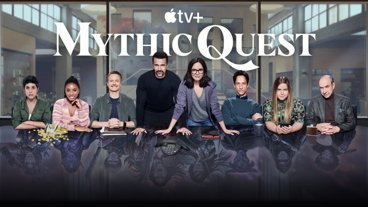No Apple TV+ movie has become a blockbuster hit bringing in enough money to rival the iPhone, but theatrical releases help the company attract subscribers — and also talent.
Writer/director Jon Watts' movie "Wolfs," starring George Clooney and Brad Pitt, is now getting a one-week limited release in theaters. That might normally just be taken as Apple not expecting the movie to do well - yet Apple simultaneously greenlit a sequel to the film.
That mixed message, and particularly the shortening of the film's time in theaters, has led to speculation that Apple may simply no longer be pursuing theatrical releases as it once did with movies like "Napoleon," and "Killers of the Flower Moon."
Naturally, Apple is not saying anything about this, but there are four reasons for a firm undertaking the expense and complexity of a major theatrical release — and while arguably Apple no longer needs any of them, it still benefits from every one.
The headline reason for putting films out in theaters is that if you don't, you're not eligible for awards. That can sound trivial, but traditionally winning awards has benefits to the profitability of a film not just in that awards season, but forever after.
Apple TV+ - theatrical prestige is key
When you're trying to stand out in a crowded market, being the streamer that wins awards definitely helps. Apple TV+ certainly needed that before, as it is the streamer with by far the smallest library, but maybe it doesn't need it any more.
For Apple TV+ now has a strong reputation for the range and quality of its few shows. Plus Apple already has the biggest award of the lot, an Oscar. Granted, it was for "CODA," which is a film Apple bought in rather than made itself.
But it's also the first Best Picture Oscar ever to be won by a streaming platform. Other streamers may win Oscars, but Apple will always have been the first.
"CODA" didn't just get the minimum theatrical release to be eligible for the Academy Awards, though. Once the nominations were announced, Apple actually sent it back into theaters.
Regular films do have more base aims than winning awards, though, and that's because they also hope to make some serious cash. Opening weekend box office takings are a huge deal, because usually they are a huge deal.
Apple is not known for turning down money, but it also isn't hurting for cash, either. Given the tradeoff between money earned in theaters and potentially a concomitant drop in subscribers to Apple TV+, the company doesn't have to think twice.
It's easy to assume, though, that people seeing a film in theaters won't subscribe at home. In practice, it's vastly more complicated than that, because a wide theatrical release can act as the most enormous advert for the streamer.
Publicity for Apple TV+
Films get billboard ads across the country, they get TV spots, they get press attention. There will be people who go see the film in theaters, there will be others who decide to wait for the streaming release.
But then there will be others for whom all of this just helps make them aware of the film. That's an audience that could miss the theatrical window, too, and be glad to catch up on the streaming release.
Home media, from VHS to streaming, has always been a boost for raising awareness of titles. But it's less clear whether a company can get sufficiently similar attention from a limited release as it can from a wide one.
This has to be something Apple is calculating. But while it's doing that, it might as well start trying to add up something far less tangible than box office receipts and increased subscriber numbers.
It can try to figure out the politics.
Attracting talent to Apple TV+
Writers, directors, producers, and actors, all want their film to be made — and they want it to be seen by as close to everyone as conceivably possible. When you're shopping an idea around to studios, broadcasters, and streamers, your first thought is to do with being greenlit.
But your second is over whether this place that has just agreed to fund your multi-million dollar epic is one that will get you in front of audiences. Without question, there are contracts at Apple TV+ which mandate a theatrical release for their project, and there probably always will be
It's just a question now of how many such contracts there are. And of whether Apple can attract talent without such a release.
And whether a one-week theatrical window plus a greenlit sequel is enough to keep filmmakers coming back to Apple TV+.
"Wolfs" is to premiere out of competition at the 81st Venice International Film Festival, before getting a week-long limited theatrical release from September 20, 2024. The film will then stream on Apple TV+ from September 27.
 William Gallagher
William Gallagher







-m.jpg)






 Charles Martin
Charles Martin
 Malcolm Owen
Malcolm Owen

 Mike Wuerthele
Mike Wuerthele
 Christine McKee
Christine McKee


 Marko Zivkovic
Marko Zivkovic


-m.jpg)






8 Comments
These are the current (silly) requirements for an academy award nomination:
Great article, lord William (Stephen Robles' dixit)
My two cents… worthless as usual.
1— quote: “For Apple TV+ now has a strong reputation for the range and quality of its few shows. Plus Apple already has the biggest award of the lot, an Oscar. Granted, it was for "CODA," which is a film Apple bought in rather than made itself.”
The Oscar to the Best Picture is given to the Producer… because it choose that movie to produce… from the ones pitched!
Apple acted as a Producer… so, it is its Oscar… even if it was not made by itself.
2— The objectives of Apple TV+ are different from the ones from Hollywood.
Hollywood wants the money back as fast as possible… being DVDs and TV releases a ‘long tail’ for revenues.
Apple wants the publicity and ability to earn prizes… but its main interest is in the long term subscription of customers and value for the platform.
Not confiscating objectives but… we can't measure Apple with the Hollywood's rule.
CODA did 1/1000 of the film that was best performing at the box office - Spider-Man, No way home. CODA is the Mac Pro of movies and audiences don't care about either.
Why is Apple trying to be a media company?